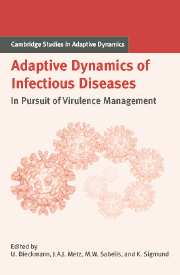Book contents
- Frontmatter
- Contents
- Contributing Authors
- List of Boxes
- Notational Standards
- 1 Introduction
- A Setting the Stage
- B Host Population Structure
- Introduction to Part B
- 6 Variation in Susceptibility: Lessons from an Insect Virus
- 7 Contact Networks and the Evolution of Virulence
- 8 Virulence on the Edge: A Source–Sink Perspective
- C Within-Host Interactions
- D Pathogen–Host Coevolution
- E Multilevel Selection
- F Vaccines and Drugs
- G Perspectives for Virulence Management
- References
- Index
- International Institute for Applied Systems Analysis
Introduction to Part B
Published online by Cambridge University Press: 15 January 2010
- Frontmatter
- Contents
- Contributing Authors
- List of Boxes
- Notational Standards
- 1 Introduction
- A Setting the Stage
- B Host Population Structure
- Introduction to Part B
- 6 Variation in Susceptibility: Lessons from an Insect Virus
- 7 Contact Networks and the Evolution of Virulence
- 8 Virulence on the Edge: A Source–Sink Perspective
- C Within-Host Interactions
- D Pathogen–Host Coevolution
- E Multilevel Selection
- F Vaccines and Drugs
- G Perspectives for Virulence Management
- References
- Index
- International Institute for Applied Systems Analysis
Summary
Part B explores the impact of host population structure on the evolution of infectious diseases. While simple models of disease ecology and evolution conveniently ignore this complication, the following three chapters underline its importance. It is shown that host population structure can qualitatively alter expectations for the course and outcome of virulence evolution.
By linking individual-based mechanisms of transmission to the demographic consequences of epidemics in host populations, simple mathematical models offer an essential prerequisite for understanding and influencing the virulence evolution of a disease. Elaborations on such models, accounting for three different types of host heterogeneity, are discussed in this part. First, even in the absence of any spatial structure, a host population may be physiologically structured with respect to certain features of individual hosts. Relevant features could be age and size or could directly relate to epidemiological processes like disease-induced mortality, recovery from an infection, or disease transmission (investigated in Chapter 6). Second, host populations can be viscous in the sense that individual hosts are connected, by spatial proximity or social relations, not to the host population as a whole but to a relatively small number of neighbors. Implications of such connectivity structures are analyzed in Chapter 7. Third, connections between hosts may be organized in a hierarchical way such that infections spread more easily within host groups than between groups.
- Type
- Chapter
- Information
- Adaptive Dynamics of Infectious DiseasesIn Pursuit of Virulence Management, pp. 72 - 73Publisher: Cambridge University PressPrint publication year: 2002

